House Passes DACA Protection Bill, But Senate Republicans Will Kill It
The House of Representatives passed a bill that would extend protection to DACA beneficiaries and other Dreamers, but it's likely to die in the Senate.
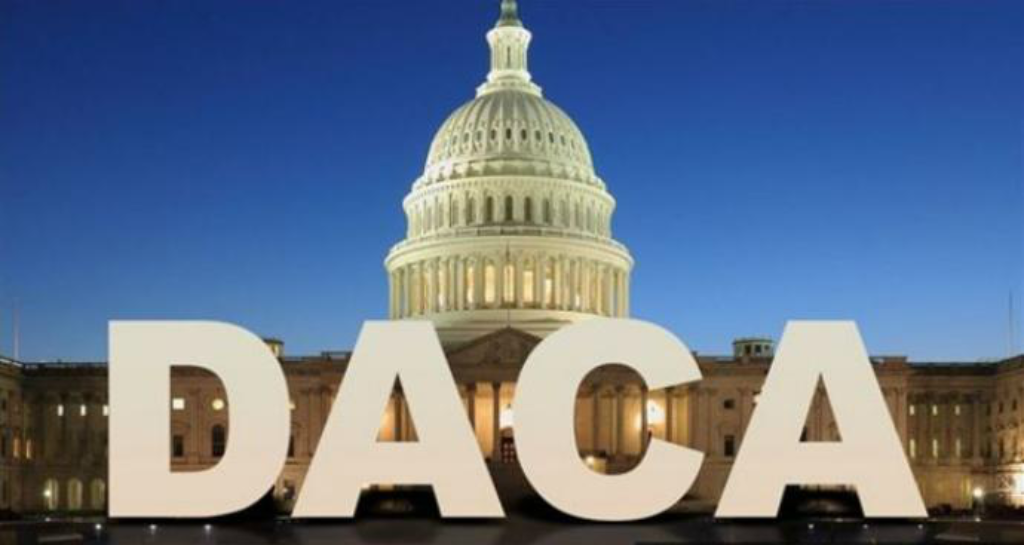
Earlier this week, the House of Representatives passed a bill extending legal protection for beneficiaries of the Deferred Action for Childhood Arrivals (DACA), but it’s unlikely that it will ever make it to the President’s desk:
WASHINGTON — The Democrat-led House passed legislation on Tuesday to grant a path to citizenship to about 2.5 million immigrants whose legal protections President Trump has moved to end, advancing a measure that highlights the bitter partisan differences over immigration.
The bill, which passed 237 to 187, with seven Republicans voting yes, would create a new legal pathway for young undocumented immigrants brought to the United States illegally as children, known as Dreamers, and for those with Temporary Protected Status, granted to immigrants whose countries are ravaged by natural disaster or violence. It is almost certain to die in the Republican-led Senate, where there is no appetite to challenge Mr. Trump on his signature issue and the majority regards it as amnesty for people who have broken the law.
The White House said on Monday that Mr. Trump would veto the measure. But as the vote tally hit 218, representing a majority for passage, scores of Dreamers seated in the House gallery rose to their feet and cheered loudly, chanting, “Si se puede!” and then the English translation, “Yes we can!” It was evidence of the national grass-roots movement they have built over more than a decade to push for permanent legal status.
The Democrats’ immigration measure was notable both for what it did and for what it did not do. It was a grant of legal status for a narrow group of immigrants, not a comprehensive measure to overhaul what lawmakers in both parties concede is a badly broken immigration system and to deal with the 11 million undocumented immigrants living in the United States. Such a measure passed the Senate in 2013 only to die in a Republican-controlled House.
Speaker Nancy Pelosi of California said Democrats wanted the narrower measure to become law, but she conceded that it was drafted as a statement of principle and a “bridge to understanding why we need comprehensive immigration reform for an immigration system that embraces the contributions of our newcomers.”
It was the latest example of Democrats’ drive to use their power in the House to challenge Mr. Trump and dramatize their disagreements with Republicans, sending a message to voters about their contrasting values and priorities. As Mr. Trump continues to press for a wall on the southwestern border, stricter asylum standards and more enforcement — and even tariffs to pressure Mexico to block migrants — Democrats spent Tuesday advocating instead for removing the threat of deportation for two of the most sympathetic groups of immigrants.
“Because of Donald Trump’s anti-immigrant policies, millions of immigrants across the country live in constant fear that they will face deportation and potentially be separated from their families,” Representative Nydia M. Velázquez, Democrat of New York, said as she argued in favor of the bill. “Let’s send a strong message to the world that we recognize that immigrants make America America.”
Republicans denounced the bill as a grant of amnesty that would provide an incentive for more illegal immigration at a time when the border with Mexico is already overrun by migrants.
“This bill does nothing to address our crisis,” said Representative Mike D. Rogers, Republican of Alabama. “Instead, it tells an entire generation of illegal immigrants that breaking our laws is rewarded.”
Democrats, Mr. Rogers added, “would rather reward illegal immigrants than secure our borders, enforce our laws and fix this crisis.”
All of this is rooted, of course, in the Presidents decision in September 2017 to end the DACA program, giving Congress a six-month delay in implementation, allegedly to come up with a legislative proposal to extend protection to the DACA beneficiaries and other so-called “Dreamers.” It quickly became apparent, though, that the President had no intention of making a deal of any kind to protect these people who were brought to the United States when they were children and are here illegally through no fault of their own. Within days after that announcement, Congressional Democrats and the President appeared to have reached a deal on the issue, but that deal fell apart quickly thereafter due to a lack of support among Congressional Republicans and the fact that the President changed his mind.
The issue became front and center in Washington again in January 2018 when Democrats forced a brief government shutdown over the issue. That strategy manifested itself after Senate Minority Leader Chuck Schumer went to the White House to negotiate with the President and reached a deal that would have enshrined DACA protections into law only to see the White House pull the rug out from underneath him hours later. Had it been implemented that deal, in addition to funding the government, would have included protection for DACA beneficiaries in exchange for $25 billion in funding for the President’s border wall. This move later caused Schumer to say on the floor of the Senate that negotiating with this President was like “negotiating with J-Ello.” The possibility of a DACA deal also came up during the five-week-long shutdown at the start of the year, but that didn’t go anywhere either. Outside of those events, though, there was little Congressional action to protect DACA beneficiaries. Initially, Congressional Republicans had said they would come up with a plan of their own, and while there were some ideas put forward, in the end, no action was taken.
With the possibility of legislative fixes largely off the table, DACA beneficiaries turned their attention to the Courts, where they have largely been successful:
- In January 2018, a District Court Judge in San Francisco ruled that the Administration’s efforts to repeal the program violated the law and issued an injunction barring the program from going into effect.
- That ruling was followed roughly a month later by a ruling from a second Federal Judge in Maryland who issued a similar ruling on much the same grounds as his colleague in San Francisco.
- In October 2018, a Federal Judge in New York City denied a motion seeking to dismiss a similar lawsuit against the Trump Administration order in a ruling that cited many of the same grounds as the previous two orders and which also cited in support of its conclusions rhetoric from the President both in his speeches and in his Tweets.
- Several months after this, in what many saw as a major setback for the Administration, the Supreme Court declined to disturb the injunction in the San Francisco case, meaning that the government was forced to go through the Ninth Circuit to appeal that case.
- In April of last year a District Court Judge in Washington, D.C. issued yet another ruling placing a hold on the Administration’s attempt to bring an end to the DACA program. That ruling was significant in that it differed in one significant respect from the previous respects. Specifically, in addition to keeping the program in place, the ruling also directed the Trump Administration to begin accepting new applicants again.
- Around the same time, the Ninth Circuit largely upheld the decision issued in January of last year by Judge William Alsop and kept in place a nationwide injunction barring enforcement of the Administration’s decision for the time being.
- In May of 2019, the Fourth Circuit Court of Appeals ruled against the Administration in an appeal of a case from the District Court in Maryland
- Finally, the most recent court development came just last week when the Supreme Court declined to accept a DACA case for expedited review, forcing the Administration to go back to the
As things stand now, the majority of DACA beneficiaries remain protected thanks to the injunctions issued by various Federal courts. That could change in an instant, though, if the Supreme Court eventually rules in favor of the Administration. That’s why a legislative fix is the only viable way to ensure that this group will not face the fear of deportation again. As it stands, though, that’s unlikely to happen. While this bill easily passed the Democratic-controlled House, it would likely face a much rockier road in the Senate. In fact, we may never even see the bill get a vote in the Senate if Mitch McConnell gets his way, and he usually does:
House Democrats’ DREAM Act will “probably not” get a vote in the Senate, Majority Leader Mitch McConnell said Wednesday.
The Kentucky Republican’s rejection of the legislation that would give a path to citizenship to immigrants brought to the United States as children is just the latest example of the Senate Republican majority sidelining House-passed legislation. McConnell said that he would want to see a broader approach on immigration before the Senate would take it up.
The House passed its bill on Wednesday, the most significant immigration bill to pass a chamber of Congress in six years.
“The Dreamers have a sympathetic case. There are circumstances under which I and others would be happy to support that. But we need to do more than that. You know there’s some genuine fixes on the legal immigration side and on the illegal immigration side that need to be addressed,” McConnell said on Fox News Radio. “There is a perfectly legitimate case for the Dreamers … but I think we need to do more than just that. And that’s the context in which I would deal with that issue in the Senate.
The Senate failed to pass an immigration deal last year after a short debate, with most Republicans opposing a bill aiding Dreamers and providing $25 billion in border security and scant support for President Donald Trump’s immigration plan either. Since passing a comprehensive bill in 2013 that the House ignored, the Senate has sputtered in its immigration debates despite broad agreement that Congress has failed to address the problem.
All of this suggests that DACA beneficiaries will continue to find themselves vulnerable to deportation at any moment should the current court protections come to an end. Congress will not do anything about this, especially not if Republicans have anything to say about it.
As the Editors of The New York Times put it, that’s unfortunate, to say the least:
Allowing Dreamers to remain in the United States without fear and without strings attached would be the moral thing to do. It also would be good politics. Voters have long viewed Dreamers favorably — after all, many of these young adults are central to their communities, attending school, paying taxes, having children who are American citizens and owning businesses.
President Barack Obama implemented DACA as an executive order and intended it to be a “temporary stopgap measure” as part of broader immigration reform, which he was unable to enact during his eight years in office. Since then, conservatives’ chief complaint about the program has been that it was a power grab intended to circumvent Congress. Jeff Sessions was among those critics. Mr. Sessions, first as an Alabama senator and later as attorney general, incorrectly described DACA as executive “amnesty” for undocumented migrants. Yet even Mr. Sessions recognized that only Congress could solve what Mr. Obama had attempted to patch together with executive action.Republicans in the Senate may lack the courage or the conviction to check Mr. Trump’s cruelty. If lawmakers truly believe Mr. Obama overstepped the law by trying to achieve immigration reform through executive orders, they ought to embrace the House’s Dreamer bill and send it to the president to sign.
Republicans won’t do that, of course, but that’s because they’ve given up any pretense of caring about people.

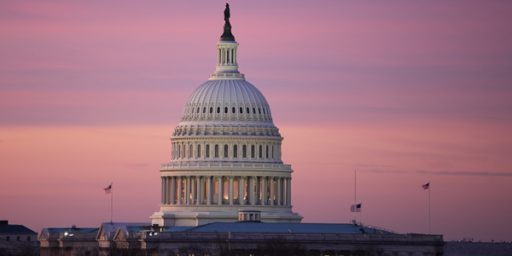
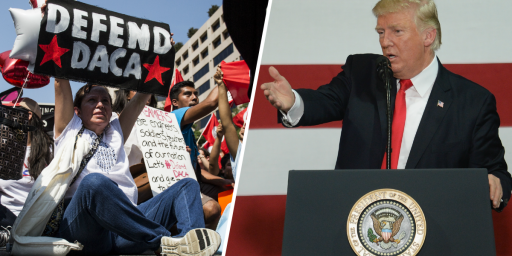

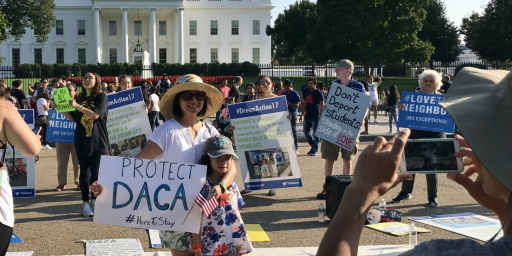
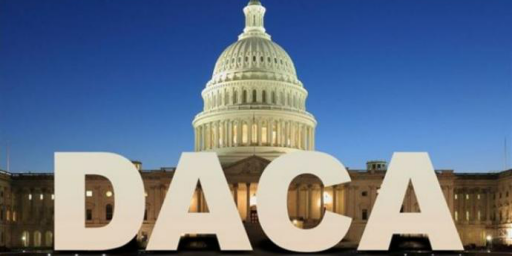
House Dems should continue to address popular issues and let McConnell obstruct them.
@Sleeping Dog: Absolutely. It appears as if the Dems are spitting in the wind but it illuminates the R’s in the Senate. I think this is why they need to start a slow walk impeachment inquiry.
It’s really unfortunate that while every one is talking about illegal aliens present in the country there is no discussion about the legal aliens who are waiting in Green Card back log for decades.
Legal aliens pay their share of taxes, healthcare costs, and follow rules / laws.
We hope that leaders will act with fairness, justice, and honesty, and will take care of every one, not just one section of population.
Can you please write about legal immigration problems as well
@Coolman:
I’ve been writing about the need for comprehensive immigration reform, which includes both addressing the undocumented immigrant population and making it easier for people to come here legally, for years. If you want to blame anyone for the lack of action then you should be talking to the Republicans.
It should be blocked. Rewarding illegal arrivals